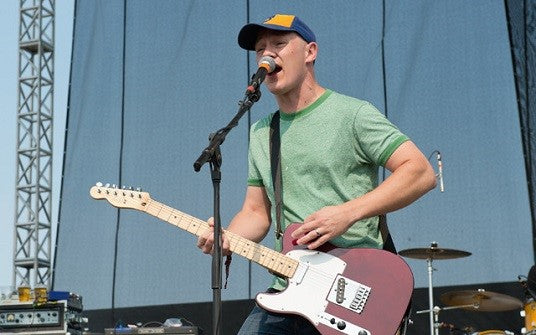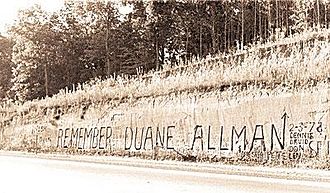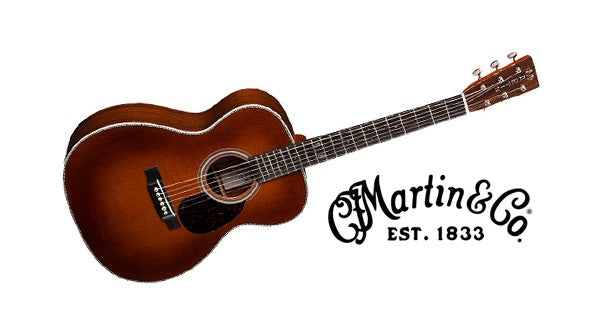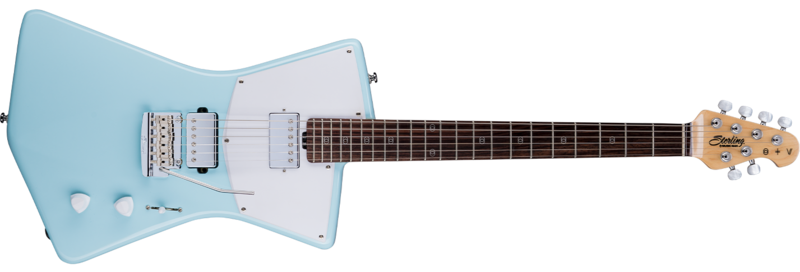Your Cart is Empty
Adirondack Guitar Lefty Profiles: Promise Ring’s Davey von Bohlen
September 17, 2020 8 min read

After grunge exploded onto the music scene in the early 90‘s, there was suddenly what seemed like a million punk-inspired bands vying for the attention of fans. As interest in arena rock and 80‘s metal began to wane, an entire new scene opened up which was largely do-it-yourself in character. This was the punk/hardcore/emo scene of the mid 1990‘s and nowhere was it more energetic and primal than in America’s heartland.
In Midwestern cities like Milwaukee, Kansas City, Omaha, Bloomington, and throughout Illinois (Urbana, Chicago and Champaign), basement parties, clubs and small theaters were packed full of energy and 120 decibels of chimey, overdriven guitars, chugging bass, and driving rhythmic fury. Playing in places like The Somber Reptile, Shank Hall, Garfield Park Pavillion, or at home parties (‘for more info call Tim please come!)’ in any basement large enough for some amps and a PA system, the Midwest emo scene started wherever local bands could manage to put on a show.
Handbill From Cap’N Jazz Show

Hand made flyers would be drawn up and a $3 or $4 cover charge would be taken at the door. It was a passionate, progressive scene where high school and college kids shared their progressive political and social values. One ad for Moldy Basement records warned: We will not carry any racist, sexist or homophobic material. The fans were passionate and idealistic and demanded the same amount of energy and idealism from their bands.
Moldy Basement Records

Those who frequented this scene in 1995, like 18 year old Davey von Bohlen, found a scene full of fiercely loyal hardcore and punk fans crowding basement parties throughout Milwaukee, intensely hanging on each band’s every note. Bohlen, who would soon become the guitarist and singer of several of the most influential Emo bands of the 90‘s and 2000‘s, including Cap’n Jazz and The Promise Ring, has suggested that the energy and enthusiasm that would eventually lead to one of the most energetic and spontaneous music movements in the country, occurred because larger acts from the coasts (LA and NY) largely ignored the Midwest. As he said on theWashed Up Emo podcast (Promise Ring is Podcast #7): “Usually bands would come through from Green Bay, and now and then we’d see a band like Fugazi come to Milwaukee, but other than that, it was pretty much a local scene...we had to make it all ourselves.”
Fugazi Show Flyer

In a small midwestern market, like Milwaukee, local bands had to take matters into their own hands if they wanted to be part of an amazing music scene. There had been a vibrant punk/hardcore/new wave scene inMilwaukee/Wisconsin since the 70‘s and 80‘s that included bands like The Shag, The Velvet Whip, Death to The Haskels, The Velvet Underground and hard to classify hardcore bands like Die Kreuzen, Black Flag and Violent Femmes. In the 90‘s, Punk and Hardcore would undergo another transformation into a number of Post-Hardcore movements one of which was emo, pop-punk and emo-pop.
Die Kreuzen Concert Handbill
Second Wave
Emo is a subgenre of Alternative music that grew out of the hardcore and punk scenes of the late 80‘s. Emo bands are known for their emphasis on emotional expression with often confessional lyrics that dwell on meaninglessness and despondency, coupled with musical materials a bit more complex than power-chord driven punk. Pioneered in the early 90‘s by bands like Washington DC’s Rites of Spring, Embrace, and Beefeater, at this stage the emo sound was similar to American punk rock, with more expressive lyrics full of poetic desperation. The sound immediately changed when it hit the Midwest, where it was combined with elements of grunge, math rock and jazz syncopation. This was the scene that Davey von Bohlen became a part of when he was beginning to play in bands in the Milwaukee area around 1995.
Dave with Promise Ring

The midwestern emo movement that Davey von Bohlen was part of with Cap’n Jazz and Promise Ring, was actually the second wave of emo music. Instead of just banging away on power chords, arpeggiated lines were incorporated, and major, minor and suspended chords were incorporated into the harmonic background. As music critic Leor Galil wrote in TheChicago Reader, “...the second-wave bands of the Midwest emo scene transformed the angular fury of D.C. emo into something malleable, melodic, and cathartic—its common features included cycling guitar parts, chugging bass lines, and unconventional singing that sounded like a sweet neighbor kid with no vocal training but plenty of heart."
Davey von Bohlen's vocal style fits that description perfectly! As he says himself in this brief Promise Ring interview from the late 90‘s, his was not a voice that would attract 500,000 fans to their album, but the music Bohlen was making with Promise Ring definitely had a ton of heart! From their inception in 1996 until they first broke up in 2002, The Promise Ring criss-crossed the heartland dozens of times, playing hundreds of shows and releasing a handful of records, including the incredibly influentialNothing Feels Good (1997).
Promise Ring Interview
“You think you know things, but you never really know..."
There isn’t much information available online about Dave’s early life other than he was born on August 11, 1975, but nothing really about how he got into music, and there are few interviews from his formative years, but we know that he broke onto the scene in 1995 as a guitar player for Cap’n Jazz. Often called the godfathers of emo, Cap’n Jazz was a short-lived hardcore band that was wildly influential. Recently, they had a reunion and Davey spoke withBrooklyn Vegan:
“When I was 18, there was godfathers of emo and it wasn't me. It was like Soulside and Rites of Spring; 'oh my god these guys are so awesome.' I think people have forgotten, like the layers peel off. Our layer will peel off and in five years you'll be asking Jim Adkins like, 'Jimmy Eat World started emo.' You know what I mean? I think it's more just like time; time passes and for people it becomes less and less memorable as they are like ushered in; I don't know if that's true, I could be totally off. To me, its guys like Revolution Summer, in 1985, where emo kicked off. Way before it turned into such a different thing.”
Cap’n Jazz ‘Basil’s Kite’ (Reunion with Beat Poet Intro)
A year later, at the beginning of 1996, still a guitarist in Cap’n Jazz, Davey formed Promise Ring as a side-project with Jason Gnewikow (guitar), Scott Beschta (bass), and Daniel Didier (drums). At the time of the formation, Gnewikow was still playing with None Left Standing, and Beschta and Didier were members of Ceilishrine. Beschta left the band following the recording of Nothing Feels Good, and was replaced first by Tim Burton (formerly of None Left Standing) and then Scott Schoenbeck. When Cap’n Jazz split up in 1996, The Promise Ring became Davey’s main gig.
Promise Ring Show Flyer

In Cap’n Jazz Davey specialized in belting out punk and hardcore guitar riffs along with some solid lead guitar playing, but in Promise Ring he stepped out to become the frontman of the band, taking on lead vocals while Jason Gnewikow took on lead guitar duties. The band split after the release of their 2002 album,Wood/Water, which was recorded with bassist Ryan Weber, but not before they were credited with making emo music more accessible and melodic, giving them the final label which has largely stuck since: ‘emo-pop’ or 'pop-punk'.
Become One Anything Anytime on Conan 2002
For an emo-pop band in the mid-90‘s, there were no overnight success stories. Promise Ring built their following through constant touring and word of mouth until their first album,30° Everywhere, was released in the fall of 1996, and made quite a stir in the underground music scene, garnering the attention of several indie rock publications. After touring, the band released some reissued singles under the titleThe Horse Latitudes, and went back into the studio to work on their breakthrough recording,Nothing Feels Good, both of which came out in 1997.
Red and Blue Jeans - Nothing Feels Good
A month before the Promise Ring released their magnum opusNothing Feels Good, Davey summarized the band's second LP by saying: "The basic idea is that you think you know things, but really you never know." You could say that withNothing Feels Good, The Promise Ring played pop music with a hardcore edge, or you might say they played punk music with the melodic invention and harmonic sophistication of a pop artist. Either way, withNothing Feels Good, The Promise Ring pulled emo music towards its pop future, and never looked back. This is why the majority of emo bands of the late 90‘s and 2000‘s cite Promise Ring as an important early influence.
Why Did Ever We Meet?
Songs like “Is this Thing On?”, “Forget Me,” “Red and Blue Jeans,” and “Why Did Ever We Meet?” marry recognizable hooks with a bright, bouncy energy that takes Promise Ring’s music to emotional territory we don’t usually associate with dark, brooding ‘emo’ lyrics. Of course, like all labels, being called ‘emo’ was not something that Davey von Bohlen was too keen on. According to a 2001 press item from theMichigan Daily, the band members collectively hated being called emo. In a world of dark, bleak ‘emo’ bands, The Promise Ring had a sound that literally transcended the scene, what one critic called ‘Husker Du meets John Denver.’
This lively, accessible, pop-oriented sound instantly attracted nationwide attention andNothing Feels Good, which received generally favorable reviews, grew Promise Ring’s following by leaps and bounds, giving them national and international recognition. To this day, the reputation ofNothing Feels Good has continued to grow, and was recognized by Rolling Stone Magazine as number 4 on the40 Best Emo Albums of All Time.
Nothing Feels Good
The Accident and Medical Problems
In 1998, while touring in support ofNothing Feels Good, the band’s tour van flipped during a midwestern snow storm. While there were no major injuries, the accident led to personnel changes in the band’s line up before going into the studio again to record their third LPVery Emergency which was released in 1999. WithVery Emergency, Dave and Promise Ring moved in an even more accessible, pop-oriented direction, which led to increased airplay on college radio stations, but also led to a minor backlash among fans of their earlier outings. In 1999 Dave started another side-project, the largely acoustic band called Vermont.
In 2000, after releasing an EP titledElectric Pink, the band got another scare when von Bohlen was diagnosed with a brain tumor. Thankfully, the tumor was benign and successfully removed with surgery. The procedure and an infection kept The Promise Ring off the road for all of 2000. The following year, they released the much less pop-oriented, much more introspectiveWood/Water. Despite the critical success ofWood/Water, Promise Ring called it quits in 2002, and have had a couple of live reunions over the years as well.
Maritime
After The Promise Ring disbanded in 2002, Dave and drummer Dan Didier formed Maritime with Eric Axelson of Dismemberment Plan. In 2003 Maritime released their first EPAdios, and over the next decade or so five subsequent albums including 2011‘s releaseHuman Hearts on which the tuneParaphernalia appeared. With Maritime Davey von Brohlen continues his punk-pop-emo sound which has attracted world wide critical acclaim, cementing his position as one of the most influential musicians in the history of emo music.
Maritime - Paraphernalia
Leave a comment
Comments will be approved before showing up.
Also in Adirondack Guitar News and Blog
Browse Our Store
Recent Articles
- Left Handed Guitarists Who Learned to Play Right Handed July 13, 2021
- The History and Importance of the Martin 28 Style July 13, 2021
- Adirondack Guitar Profiles: St. Vincent July 13, 2021
- Adirondack Guitar Profiles: John Petrucci May 05, 2021
- How to Turn Your Music Skills into a Career March 30, 2021



